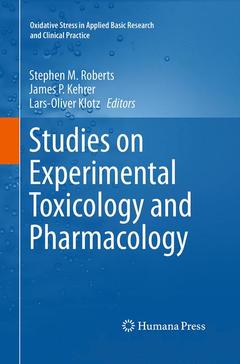Studies on Experimental Toxicology and Pharmacology, Softcover reprint of the original 1st ed. 2015 Oxidative Stress in Applied Basic Research and Clinical Practice Series
Coordonnateurs : Roberts Stephen M., Kehrer James P., Klotz Lars-Oliver

This book focuses on data describing the roles of free radicals and related reactive species, and antioxidants, in the causes and treatments of diseases, examining both clinical and pre-clinical trials, as well as basic research. The book is divided into sub-sections with chapters on toxicological mechanisms, agents that produce toxicity, and special topics including areas such as antioxidant supplements, oxygen toxicity, toxicogenomics, and marine biology.
Studies on Experimental Toxicology and Pharmacology promotes the concept of using biomarkers of free radical- and reactive species-induced injury as adjuncts to classical laboratory testing and the ability of antioxidants to provide cellular protection. There is increasing evidence that free radicals and other reactive species are causative, or at least supporting factors, that impact organisms and cause numerous tissue disorders.
With contributions from international experts in the field, this volume is a valuable resource for researchers and postgraduate students in toxicology and related fields, as well as clinicians and clinical researchers.
Part I. Toxicological Mechanisms and Evaluation of Oxidative Stress.- A historical perspective on oxidative stress and intracellular redox control .- An overview of free radicals as causes and consequences of toxicity.- Oxidants, radicals, free radicals, and other bad stuff in mechanisms of toxicity.- Lipid oxidation.- Protein oxidation and toxicology.- Oxidative stress and DNA damage association with carcinogenesis: A truth or a myth?.- Glutathione and thiols .- Reactive oxygen species as initiators and mediators of cellular signaling processes.- Role of oxidative stress in the process of carcinogenesis.- Part II. Agents that produce toxicity – mechanisms and therapeutic interventions.- Isolation of murine adult bone marrow and fetal liver cells for mechanistic assessment of hematotoxicity caused by organic solvents.- Oxidative stress and ethanol toxicity.- Pharmaceutical agents.- Insecticides and herbicides .- Health effects of indoor air pollution due to cooking with biomass fuel.- Outdoor pollutants.- Oxidative Stress and the Inorganic Carcinogens.- UV-induced signaling: Role of reactive oxygen species.- Nanomaterials.- Chemical warfare agents.- Part III. Special topics.- On the biochemistry of antioxidants — current aspects.-Prevention of age-related diseases — Effects of antioxidant supplements.- The neural progenitor cell (NPC) niche in the adult brain provides a target for neurotoxicity — a potential Adverse Outcome Pathway for ROS-induced NPC dysfunction with higher sensitivity during aging..- Oxygen toxicity: From cough to convulsion.- Oxidative stress in reproductive toxicology.- Toxicogenomics-based assessment of xenobiotic-induced oxidative stress.- Aquatic and marine biology.
Stephen M. Roberts, Ph.D. is Director of the Center for Environmental & Human Toxicology at the University of Florida, and is a Professor with joint appointments in the College of Veterinary Medicine, College of Medicine, and the College of Public Health and Health Professions. He received his Ph.D. from the University of Utah College of Medicine, and has developed an active research career focusing on mechanisms of toxicity of drugs and chemicals with funding from the National Institutes of Health, the U.S. Environmental Protection Agency, the Department of Defense, and private industry. He has served on a federal scientific advisory committees dealing with matters related to toxicology for the U.S. Department of Health and Human Services, the Food and Drug Administration, and the U.S. Environmental Protection Agency.
James P. Kehrer Ph.D received a B.S. in pharmacy from Purdue University and a Ph.D. in pharmacology/toxicology from the University of Iowa College of Medicine. He did postdoctoral work at Oak Ridge National Laboratory and served on the faculty at the University of Texas at Austin for 25 years. He is currently Dean of the Faculty of Pharmacy and Pharmaceutical Sciences at the University of Alberta. Dr. Kehrer has served on numerous NIH grant review panels, as a member of the US-EPA Science Advisory Board Exposure and Human Health Committee, and on the US-FDA Nonprescription Drug Advisory Committee. He served as Editor-in-Chief of Toxicology Letters for 21 years. He is a Fellow of the American Association for the Advancement of Science.
Lars-Oliver Klotz, Ph.D. is a Professor of Nutrigenomics at Friedrich Schiller University in Jena, Germany. His research interests include the biochemistry of oxidative stress and stress-induced signal transduction. Following his Diploma degree in biochemistry (University of Tübingen), he received a Ph.D. in biochem
Contributions from internationally recognized scientists
Provides up-to-date information on translational research into clinical applications to improve health care
Provides a single resource on environmental issues in a comprehensive and organized presentation eliminating the need for a lengthy literature search ?
Date de parution : 08-2016
Ouvrage de 498 p.
15.5x23.5 cm
Date de parution : 10-2015
Ouvrage de 498 p.
15.5x23.5 cm
Thèmes de Studies on Experimental Toxicology and Pharmacology :
Mots-clés :
Antioxidants; Carcinogenicity; Oxidative Stress; Pollutants; Toxic agents; Toxicity; Apoptosis



